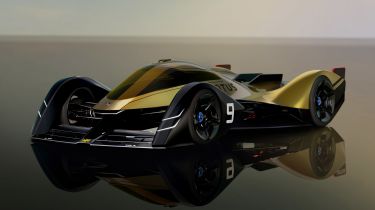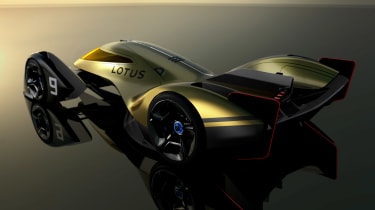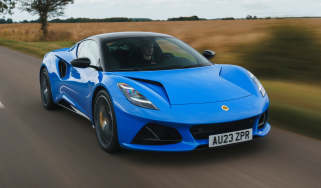Lotus E-R9 EV endurance racer previews future engineering tech
The Lotus E-R9 EV concept gives a window into the future of electric powertrains and aerodynamics for the British brand’s racers
Lotus is a motorsport innovator, and with this E-R9 EV endurance racer concept it’s giving us a preview to the kind of tech we could see lining up on race grids by 2030.
Developed by Lotus Engineering, it’s a technology showcase of the company’s “philosophy, capability and innovative spirit in the fields of advanced electrified powertrains and aerodynamics.”
As a result, the Lotus E-R9 features four electric motors – one per wheel – with torque vectoring to improve the car’s dynamic ability, building on technology already integrated on the brand’s Evija hypercar. Lotus says that for the E-R9, the tech would be fully adjustable on the move.
Another significant innovation for the vehicle is its aerodynamics. The E-R9 uses ‘morphing’ body panels that are located across the car’s delta wing profile. These surfaces are active and can change their shape at the touch of a driver-activated button to adjust the level of downforce and drag on offer.
The tech could offer a setting for low downforce and low drag to maximise straight-line speed, and a high-downforce mode to improve cornering potential, with the panels set to either one of two modes: driver-operated, or automatic, according to performance sensor inputs.
The active aero extends to vertical control surfaces at the rear that help the car change direction that bypass the limit of grip from the car’s tyres, which Lotus claims results in a vehicle that’s “partly driven like a car and partly flown by a fighter jet.”
Lotus has an illustrious history in motorsport, and the car’s name stems from this. E-R stands for ‘Endurance Racer’ while the 9 is a reference to the Lotus Mark IX that marked the firm’s debut at the Le Mans 24 hours in 1955.
The aim of the E-R9 project is to showcase what an endurance racer could look like at the end of the decade; if the car were to line up on the grid in 2030 it would mark the 75th anniversary of the Mark IX.
It’s also finished in black and gold, a nod to the colour scheme of famous Lotus racers from the past, while the jetfighter-style canopy is mounted centrally in the delta wing body.
Click here to read more about the 1,381bhp Lotus Evija hypercar...
Find a car with the experts










